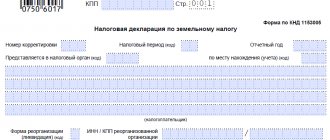Property tax belongs to the regional group. The right to set the tax rate is the prerogative of legislators of the constituent entities of the Russian Federation. However, the law requires taking into account the maximum upper threshold of rates specified in Chapter 30 of the Tax Code of the Russian Federation.
The property tax burden applies to both legal entities (enterprises and organizations on whose balance sheets the taxable property is located) and individuals whose ownership of a particular property object has been confirmed in the established manner.
Legal basis for taxation of individuals
Taxation of property of citizens of the Russian Federation is carried out in accordance with the provisions of the law of 1991 “On taxes on property of individuals” (as amended). There are also instructions that are designed to ensure the correct application of the law.
At the local level, property tax for individuals, including in 2021, is regulated by the Tax Code (Chapter 32). Based on the provisions of the Tax Code, each municipality adopts relevant legal acts that determine rates, benefits and some other issues.
Deferment and installment payment of tax
Late payment of personal income tax is punishable by fines, but not always. The procedure and deadlines for paying taxes may be violated if the reasons for this are compelling. Any citizen can write a petition for deferment and installment payment of taxes if there are the following grounds provided by law:
- the payer suffered damage as a result of force majeure circumstances (natural disasters, accidents, etc.), which must be documented by the relevant authorities (Ministry of Emergency Situations structures or municipal authorities);
- a difficult financial situation that does not allow making full contributions to the tax service.
In the first case, the amount of debt is frozen, that is, it remains the same for the entire deferment period, and in the second case, interest is accrued on the entire amount of the debt for the entire deferment period. New deadlines for submitting reports are determined after consideration of the application and will be indicated in the corresponding decision.
In some cases, it is possible to provide deferment and installment payment of taxes for other reasons. Such grounds can be established at the level of local control and government bodies, which have the right to independently adopt by-laws of this order.
Attention! Due to recent changes in legislation, the legal information in this article may be out of date! Our lawyer can advise you free of charge Ask a question to a lawyer
Tax objects
The following property owned by individuals by right of ownership is subject to taxation (Tax Code, Article 401):
- housing (apartments, houses, rooms, see Tax on the sale and purchase of an apartment);
- other premises and buildings, including unfinished ones;
- dachas;
- garages, parking spaces;
- share in property (except for the property of a multi-apartment residential building that is in common ownership).
Taxpayers
This type of tax is subject to payment by the owners of the above-listed property upon tax notice. The tax applies not only to citizens of the Russian Federation, but also to any persons who have property in the Russian Federation, regardless of their age. Even being a minor is not a reason for non-payment. In such cases, payments are made either by the parents or guardians of the minor property owner.
Tax accruals on joint property can be paid by one owner in agreement with the others.
Individual taxes: payment deadlines and responsibility
Across the country, taxpayers are required to pay their back taxes for the previous year by December of this year.
In relation to defaulters, regardless of the reason for non-payment (intentional and unintentional, that is, due to ignorance, forgetfulness, etc.), the following actions are applied:
- notification of the debtor's employer and collection of debt from wages;
- restriction of the debtor’s travel outside the Russian Federation;
- going to court and forcibly collecting debt;
- imposition of penalties (penalties and fines).
Regarding the last point, you should know that a fine and a fine are not the same thing. If a person recognized as a tax payer is several days late with payment, a certain amount is charged for each day of delay, which is added to the amount of the debt. The penalty interest rate in 2021 is 9.75.
The fine applies to persons who do not consider it necessary to pay this type of tax at all and ignore tax notices. However, when calculating a fine, the reasons for non-payment are taken into account. If the defaulter manages to prove that his delay was unintentional, then the fine will cost him 20% of the amount of the debt. Otherwise you will have to pay twice as much. Stricter legal measures are applied to persistent defaulters, including repossession of housing.
Land tax in 2021: changes and calculation features
So, in order to avoid problems and unpleasant moments, it is better to go to the tax office and inquire about your debt, especially since there is nothing terrible about it. You can also find out the necessary information on the websites (by registering in advance):
- Federal Tax Service (through your personal account);
- State Services;
- Federal Bailiff Service (if judicial enforcement proceedings have already been initiated).
Personal income tax report for individuals
In what cases are citizens required to contact the tax authorities themselves to file a declaration? The law establishes that a personal income tax report for individuals must be submitted if:
- there was a sale of a vehicle or property that the citizen owned for less than three years;
- there was a contract of donation of property from strangers who do not have family ties with the recipient;
- the citizen received winnings from games associated with risk (for example, a lottery);
- income was received under a paid agreement (rent, provision of services, etc.) or an employment contract with a person who is not a tax agent;
- income is received from persons operating outside the Russian Federation (that is, from foreign sources).
The personal income tax report for individuals, that is, the declaration, has its own deadlines for filing with the tax authorities. The citizen must report by May 1 of the current year for the previous period. Payment of personal income tax in 2021 may not coincide with the deadline for filing the declaration, the main thing is that all payments are repaid by July 15. If this day falls on a weekend, then the deadline for individuals to pay taxes in 2017 will be the next working day.
The new deadlines for submitting reports affected only taxes on citizens’ income, and as for property taxes (transport, land, etc.), they must be paid, as before, before December 1.
The tax on real estate from 2021, more precisely on income received from its sale or receipt as a gift, has also changed somewhat. The changes affected the calculation of the amount required for transfer. Now all real estate that was sold in 2021 is taxed under the new rules. Real estate tax from 2021 can be calculated in one of two ways, choosing a larger amount:
- the price of the object sold under the alienation agreement;
- cadastral value of the property.
It must be taken into account that the cadastral value is taken on the first day of the reporting period, and not in full, but in the amount of 70% of the amount. Thus, it has become more difficult to reduce property taxes from 2021, since the largest amount must be taken into account in the calculations.
Tax base: types of calculation
Personal property tax is calculated in two ways in 2021:
- based on inventory value (Article 404 of the Tax Code of the Russian Federation);
- based on cadastral value (the process is regulated by Article 403 of the Tax Code of the Russian Federation).
From 2021, it is planned that all entities will switch to calculating the tax base based on cadastral value. This is explained by the fact that it is closer to the market value than the inventory value. In addition, this taxation procedure makes it possible to involve owners of objects that do not have an inventory value in paying taxes. The transition began in 2015 and is being implemented gradually.
Personal property tax: rates
They are determined by municipalities/cities of federal significance, but the maximum sizes are specified in the Tax Code.
If you use the inventory value of an object, then the rates are calculated using the formula: Rate = total inventory value of objects X coefficient - deflator (1.425 in 2021). The rates are as follows:
- no more than 0.1% for objects with an inventory value of less than 300,000 rubles;
- over 0.1%, but not more than 0.3% for objects with an inventory value of 300,000 - 500,000 rubles;
- 0.3-2.0% for real estate with an inventory value more than 500,000 rubles.
If property tax for individuals is calculated taking into account the cadastral value of real estate, the rates in 2021 are as follows:
- 0.1% in relation to residential buildings and premises, unfinished residential properties, garages, outbuildings with an area of no more than 50 m2;
- 2% in relation to objects with a high cadastral value (more than 300 million rubles);
- 0.5% in relation to other premises, buildings, structures.
Regarding the first point, local authorities have the right to lower (down to zero) or increase (but not more than three times) the recommended rates. Moreover, they can do this in a differentiated manner.
More accurate information about rates in a specific region is provided on the Federal Tax Service website.
How to pay?
You can pay property tax upon notification from the Federal Tax Service in different ways:
- at a bank branch (through a cash desk or terminal);
- using Internet banking;
- through an electronic payment system.
The notification you received contains all the necessary and sufficient information to make the payment.
If for some reason the “chain letter” has not reached you, the necessary information can be obtained through the “Taxpayer Personal Account for Individuals” service on the Federal Tax Service website. With its help, you can get all the information related to you, as well as receive notifications and pay for them with the help of Federal Tax Service partner banks.
By the way. It must be borne in mind that, having received information through your personal account, you are considered officially notified. With all the consequences.
Additionally, the law does not exempt you from paying the tax if you fail to receive the notice. If you have some taxable property, and the Federal Tax Service has not sent you a notice of the need to pay for it. Then, as a law-abiding citizen, you are obliged to notify the tax authorities about your property before December 31 so that you can be issued an invoice. The message form is posted on the Federal Tax Service website.
If a citizen does not do this on time and independently, and the tax authorities themselves discover undeclared property, then they will issue a tax notice to the “dodger” for 3 periods. The statute of limitations is 3 years.
Calculation based on cadastral value
When calculating tax based on cadastral value, some concessions are provided for payers:
- in the first year a reduction factor of 0.2 is applied;
- deductions are made from the cost in the amount of 10 m2 for a room, 20 m2 for an apartment and 50 m2 for a house.
It should be noted that such a benefit is given only for one object in the category: one house, one apartment, one room. Owners of several properties themselves choose the property to provide benefits. Otherwise, the tax service will determine this for them. It goes without saying that the property should not be used for commercial purposes.
The procedure is as follows:
- Find out the cadastral value of an object
- Define deduction
- Select bet
Changes in the cadastral value of land plots
The calculation itself is done like this:
- First, the cadastral value is determined taking into account the tax deduction: cadastral value per square meter x (object area, m2 - tax deduction area, m2)
- Next, the tax will be calculated: cadastral value including tax deduction x current tax rate
When to pay property tax if the fixed asset is disposed of within a year
In addition, the taxpayer has the right to pay tax and submit a tax return early in the event of disposal of all fixed assets during the tax period. However, if before the expiration of the specified period the organization again acquires fixed assets, it must submit an updated tax return to the tax authority and pay additional tax in a timely manner (letter of the Federal Tax Service of Russia dated July 30, 2013 No. BS-4-11/13835).
How to “simplified” to reflect the disposal of a fixed asset in tax accounting, learn from the publication “How to correctly write off fixed assets under the simplified tax system?”.
Benefits for property tax for individuals
An approximate list of individuals exempt from paying property tax is determined by the Tax Code. The category of beneficiaries includes:
- persons holding the title “Hero of the Soviet Union”;
- persons awarded the title “Hero of the Russian Federation”;
- Knights of the Order of Glory of all degrees;
- participants in wars (civil and Great Patriotic War), including those who fought in partisan detachments;
- participants in combat operations in Afghanistan and other countries;
- military personnel who served 20 years or more;
- disabled since childhood;
- disabled people of the first two disability groups;
- "Chernobyl";
- participants in nuclear weapons tests;
- liquidators of accidents at nuclear installations at military facilities;
- patients with radiation sickness;
- parents or spouses of persons killed in the line of duty;
- pensioners;
- individuals who are engaged in professional creative activities in premises specially equipped for workshops, studios, and ateliers.
This list is far from complete. Localities have their own laws and regulations that give the right to benefits on property taxes for individuals.
All ways to make a profit from real estate investment
Persons who have this right independently submit documents confirming this to the tax authorities. If documents are submitted late, a recalculation is made for a maximum of three years.
Deadlines for paying taxes by individuals in 2021 - when to pay?
Property taxes
The deadline for individuals to pay property taxes (land, transport and property taxes) in Art. 363, 397, 409 of the Tax Code of the Russian Federation is established no later than December 1 of the year following the previous tax period, which is equal to a year. These taxes are paid after the Federal Tax Service sends the appropriate tax notices. They must be sent no later than 30 days before the tax payment deadline (Letter of the Federal Tax Service of Russia dated January 11, 2016 N BS-4-11 / [email protected] ). It is important to know that individuals pay tax for no more than three tax periods preceding the calendar year of sending the tax notice. Sending a tax notice is allowed no more than three tax periods preceding the calendar year of its sending (clause 3 of Article 363, clause 4 of Article 397, clauses 3 and 4 of Article 409 of the Tax Code of the Russian Federation). You can pay tax without notification on the Federal Tax Service website using the “Payment of taxes for individuals” service. According to Part 2.1. Art. 23 of the Tax Code of the Russian Federation, if taxpayers have not received a notification, they are obliged to report their real estate and (or) vehicles to the tax authority of their choice (Order of the Federal Tax Service of Russia dated November 26, 2014 N ММВ-7-11/ [email protected ] ). This must be done before December 31 of the year following the reporting year, including after the expiration of the deadline for payment of transport tax, land tax and personal property tax established by clause 1 of Art. 363, paragraph 1, art. 397, paragraph 1, art. 409 of the Code. For example, a person is obliged to pay transport tax by December 1, 2021, but has not received a notification, then the message must be sent by December 31, 2021. In accordance with paragraph 3 of Art. 129.1 of the Tax Code of the Russian Federation, untimely submission by a taxpayer of such a message entails a fine in the amount of 20% of the unpaid amount of tax (Federal Tax Service of Russia dated March 29, 2017 N BS-4-21/5840).
When must a taxpayer fill out a personal income tax return?
Citizens are required to file a personal income tax return in the following cases: when receiving income from the sale of real estate that has been owned for less than 3 years, and from the sale of property rights (assignment of the right of claim); when receiving a gift of real estate, vehicles, shares, interests, shares from citizens who are not close relatives; upon receipt of remuneration stipulated by the agreement from individuals and organizations that are not tax agents, including income under rental or rental agreements; when receiving lottery winnings, as well as income from other risk-based games; when receiving income from foreign sources. The declaration for the previous year is submitted before April 30 of the following year to the tax office at the place of residence (Article 229 of the Tax Code of the Russian Federation). The amount of calculated tax does not have to be paid when filing a declaration; this can be done before July 15 (Article 227 of the Tax Code of the Russian Federation). Given that July 15, 2021 falls on a Saturday, the last day to pay taxes will be July 17, 2021. Income from the sale of real estate purchased after January 1, 2021, in the 3-NDFL tax return must be calculated according to the new rules, that is, select the largest amount that will be taxed from the following two: the price of the purchase and sale agreement under which the real estate was transferred; cadastral value as of January 1 of the year in which the transaction was made, multiplied by a coefficient of 0.7.
When is tax deferment and installment payment possible?
The deadline for paying taxes by individuals may be missed for good reasons - if there are grounds for obtaining a deferment. Deferment (installment plan) is provided for a period of up to 1 year at the request of the taxpayer on one of the grounds of clause 2 of Art. 64 of the Tax Code of the Russian Federation, and he must not only confirm his financial situation, which does not allow him to pay the required amount, but also that he will have the opportunity to do this during the period of deferment or installment plan. An individual may request deferment and installment payment of tax on the following grounds: damage to the taxpayer caused by force majeure circumstances, which is confirmed by a conclusion on the occurrence of these circumstances and a damage assessment report, which are provided by local authorities or the Ministry of Emergency Situations; property situation in which it is impossible to pay the entire amount of tax at once (information is provided about the citizen’s movable and immovable property, except for property that cannot be foreclosed on). If the deferment or installment payment of tax is due to force majeure circumstances, interest is not accrued on the amount of the debt, and on the second - interest is accrued in the amount of 1/2 of the refinancing rate of the Central Bank of the Russian Federation in force during the period of deferment or installment plan. The laws of the constituent entities of the Russian Federation and regulatory legal acts of representative bodies of municipalities may establish other grounds and conditions for granting deferment and installment plans for the payment of taxes, penalties and fines.
Interesting facts about taxes
There have been many interesting facts related to taxes throughout the history of mankind, including in Russia.
- One of the initiatives of Peter I was the tax on baths, introduced in 1704. For their home baths, people had to pay from 15 kopecks (the rate for peasants) to 3 rubles (the rate for first-class merchants and duma people). All other classes contributed 1 ruble.
- During the time of Peter I they also levied a tax on non-working capital. It was considered contraband and was confiscated.
- Officials in the Tver region refused to collect taxes on dacha plots because delivery of receipts cost twice as much.






